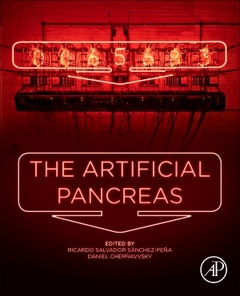The Artificial Pancreas Current Situation and Future Directions
Coordonnateurs : Sánchez-Peña Ricardo S., Cherñavvsky Daniel R.
Directeur de Collection : Sanchez Edgar N.

The Artificial Pancreas: Current Situation and Future Directions presents research on the top issues relating to the artificial pancreas (AP) and its application to diabetes. AP is a newer form of treatment to accurately and efficiently inject insulin, thereby significantly improving the patient?s quality of life. By connecting a continuous glucose monitor (CGM) to a continuous subcutaneous insulin infusion using a control algorithm, AP delivers and regulates the most accurate amount of insulin to maintain normal glycemic values. Featured chapters in this book are written by world leaders in AP research, thus providing readers with the latest studies and results.
2. Getting IoT-ready
3. Multivariable AP with adaptive control
4. The ARG algorithm: clinical trials in Argentina
5. Use of intraperitoneal insulin delivery for artificial pancreas
6. Physiological models for artificial pancreas development
7. Deployment of modular MPC for type 1 diabetes control: the Italian experience 2008–2016
8. Integrating the clinical and engineering aspects of closed-loop control: the Virginia experience
9. Strategies to mitigate hypoglycaemia in the artificial pancreas
10. Multiple-signal artificial pancreas systems
11. Artificial pancreas in pediatrics
Daniel R. Cherñavvsky is Assistant Professor of Research in the Center for Diabetes Technology at the University of Virginia. The Center for Diabetes Technology is a multidisciplinary group of research academicians with specialties in Pediatrics, Endocrinology, Behavioral Medicine, Systems Engineering, Mathematics, and Statistics, working collaboratively for the advancement of technology for the treatment of type 1 diabetes. Currently, Dr. Cherñavvsky is leading several artificial pancreas studies in pediatric and young adult populations. In addition, Dr. Cherñavvsky collaborates with the International Artificial Pancreas (iAP) Study Group, which joins investigators from Italy, France, Israel, Argentina, and the USA. He had conducted the first-ever outpatient clinical study of a cell phone-based artificial pancreas system and performed US and international outpatients-base
- Focuses on Type 1 Diabetes Mellitus (T1DM) that is primarily found in children and typically treated by means of a syringe or insulin pump
- Features research and results from top academic experimental groups, and from universities such as Harvard (USA), the University of Virginia (USA), the University of Padova (Italy), the University of Montpellier (France), and the Buenos Aires Institute of Technology (Argentina)
- Discusses clinical trials of AP from around the world, including the United States, the EU, Latin America, and Israel
Date de parution : 04-2019
Ouvrage de 306 p.
19x23.3 cm
Thèmes de The Artificial Pancreas :
Mots-clés :
Adaptive algorithms; Adaptive model predictive control; Artificial pancreas; Clinical testing; Closed loop; Closed-loop glucose control; Continuous glucose monitor; Control algorithms; Diabetes; Diabetes technology; Exercise; Feedforward control; Glucagon; Glucose control; Glucose metabolism; Hypoglycaemia; Identification; In-patient trials; Insulin; Insulin limitation; Insulin on board; Insulin pump; Insulin therapy; Intraperitoneal infusion; Maximal models; Minimal models; Model predictive control; Multivariable artificial pancreas; Out-patient trial; Pediatric; Real-life testing; Recursive system identification; Rescue carbohydrates; Safety monitoring; Simulation; Sliding mode control; Subspace methods; Switched LQG control; Type 1 diabetes; Type 1 diabetes (T1D)



